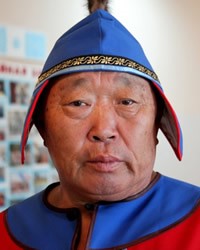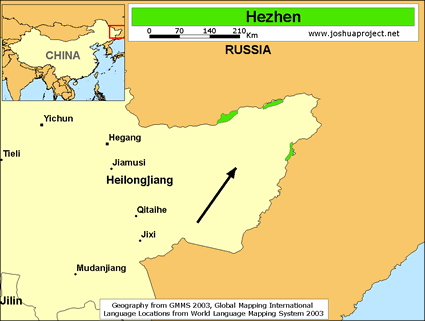Nanai means person of the Earth. Nanai are a part of the Tunguso-Manchjury group in the southern branch. A majority of the Nanai in Russia live on the territory of Khabarovsky Krai, in Nanaisky, Ulichisky, Solnechny, and Komsomolsky. They also live in Primorsky Krai and Sakhalinsk region.
Over the border in northeast China, they call themselves Akani. Russians call the Nanais Golds, which is also used by the Ulchis, the Orochis, and the Negidals for a name with local origins. The Chinese call them Hezhen. In China, the Hezhen speak Mandarin along with Nanai, their own language.
The Hezhen lead a reasonably isolated life. There was very undeveloped communication between the different groups; some groups were even considered to be a separate people. The Hezhen would do different things, fishing and hunting, depending on the movement of varieties of fish in the river. For example, in the spring and summer the Hezhen would hunt for food, while in the winter the animals were hunted for fur. During their daily lives, the Hezhen run businesses such as, fishing and hunting. They also grow many different things like wild herbs, home produce; however, ever since the 19th century they have started to create their own gardens and stock breed. The Hezhen main meal is fish. They know several types of ways to prepare fish for long keeping, such as: stocking, freezing, salting, smoking, and pickling. Besides fish, they enjoy eating raw bone marrow, liver, nostrils and other parts of animals that have been caught by the hunters. They separate the meat on the carcass, selecting the meat for saving, and then the rest of the meat is boiled or fried over a fire.
The Hezhen make their own national clothes using fish, deer, elk leather and skin, and other forms of animals. Depending on what the occasion is (occasions like: everyday, festive, work, wedding, etc.), the Hezhen will have different outfits. Generally, their outfit would consist of a skirt and jacket, a leather belt with conical metal pendants, mittens with figures of lizards, serpents, or frogs and hats with branching horns or wolf, bear, or fox fur attached to it. Occasionally they would incorporate bits of Chinese mirrors into the outfits.
Today we see a restoration of their culture. There are public organizations and associations founded in the Nanaisky and Komsomolsky regions, along with one museum. They have even started to publish their own books and textbooks in their language. Also, just like any other people group they celebrate festivals and holidays.
Their traditional belief is shamanism; however, there are some who are Tibetan Buddhist. The Nanai believe that the shamans have the power to expel bad spirits by praying to the gods. They worship the spirits of the sun, the moon, the mountains, the water, and the trees. Among all of their beliefs, they believe that the land was once flat until great serpents gouged out the river valleys. They also believe that all the things in the world, each thing possess its own spirit who wanders independently throughout the universe. Inanimate objects were regularly personified. A common example is Fire; it was personified as an elderly woman which they called Fadzya Mama. The children were not allowed to run up to the fire, because they might startle Faszya Mama. Men were always courteous in the presence of fire. They would generally bury the deceased in the ground, unless it was a young baby under one year whom they would put in a tree.
The Hezhen need the chance to hear and respond to the ways of Jesus Christ. There are Christians among them who can do this. Chinese Christians can do the same.
Please help the Hezhen in China to recognize the God of all Creation and to worship him rather than the creatures He has made.
Pray that their language would be preserved so that these indigenous people may someday praise his name in each language.
Pray that God is continued to be glorified in the Chinese church. May they reach out to the Hezhen and other remote tribes.
Scripture Prayers for the Hezhen in China.
Jubilee Adleta
Nanai http://en.wikipedia.org/wiki/Nanai
| Profile Source: Joshua Project |











